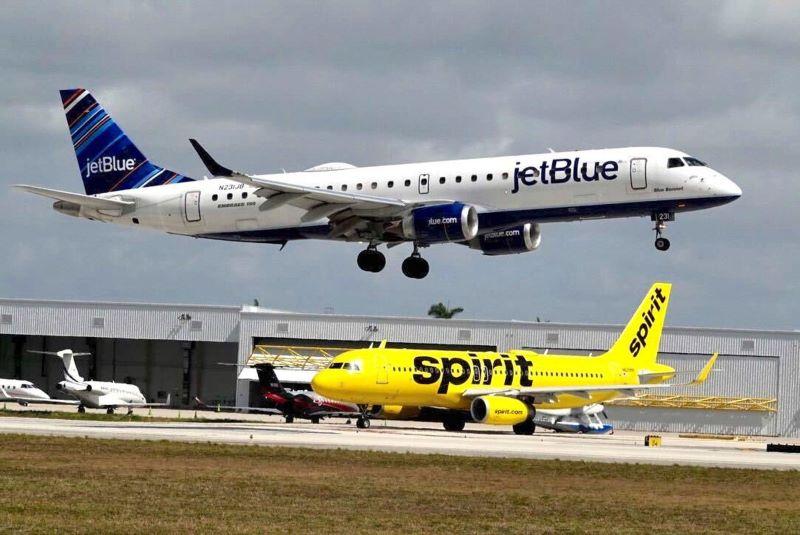Daily Memo: JetBlue Takes On DOJ For A Second Time—With No Predictable Outcome

Now that the U.S. Justice Department (DOJ) is suing to block JetBlue Airways’ proposed acquisition of Spirit Airlines, JetBlue finds itself in an unprecedented position—its plans for both the Spirit merger and its alliance with American Airlines remain entangled in litigation.
After JetBlue emerged as the victor over Frontier Airlines in the battle for Spirit in July 2022, speculation began to grow regarding how the hawkish antitrust division of the DOJ would view the tie-up given that Spirit’s ULCC model would disappear once the merger was complete.
Indeed, the U.S. Transportation Department (DOT), which has thrown its support behind the lawsuit, said DOJ determined the proposed deal violates antitrust law by eliminating “the largest, most aggressive ultra-low-cost competitor.”
It was always going to be an uphill climb for JetBlue to gain approval for the merger. Back in 2021, before Frontier and JetBlue began vying for Spirit, U.S. President Joe Biden issued an executive order “Promoting Competition In the American Economy.” That order called on leading antitrust agencies, the DOJ, and the Federal Trade Commission “to enforce the antitrust laws vigorously and recognize that law allows them to challenge prior bad mergers that past administrations did not previously challenge.”
During a recent interview with National Public Radio regarding the merger, the President of the American Antitrust Institute Diana Moss said she thinks “we have a more aggressive set of antitrust enforcers at the DOJ and the FTC [Federal Trade Commission] ... The Biden administration is committed to promoting competition and sort of slowing down the kind of consolidation we’ve seen in the U.S. economy for many years.”
This is not the first time antitrust enforcers have attempted to block airline mergers. In August 2013, the DOJ filed a lawsuit against the merger between American Airlines and US Airways, contending the tie-up would lessen competition and result in passengers paying higher airfares. The DOJ and the airlines reached a settlement in November of that year, and part of the agreement required the two airlines to divest slots at Washington Reagan National and New York LaGuardia airports, which increased the presence of LCCs at those facilities.
JetBlue has offered similar types of concessions to push the Spirit deal through, such as the divestiture of Spirit’s gates, takeoff and landing rights and some ground facilities at Boston Logan, Newark, LaGuardia, and Fort Lauderdale.
But the DOJ seems suspect of those remedies. “In other words,” the department said, “JetBlue and Spirit claim they would replace significant lost competition in hundreds of markets across the country, the Caribbean and Latin America, where defendants compete today, through a plan to divest a total of 15 gates, related operating rights and ground facilities at a handful of airports.” The airlines haven’t finalized those divestitures, the department observed.
Given DOJ’s current stance, it is far from certain if JetBlue and Spirit can fend off court proceedings and reach a settlement with regulators.
This merger is also different from those in the recent past. Spirit was a reluctant partner for JetBlue and sternly stated its preference to merge with Frontier prior to JetBlue’s hostile takeover. In 2022, as the bidding battle was underway, Spirit’s CEO Ted Christie said it defied common sense to believe a merger with JetBlue would gain regulatory approval. Obviously, Spirit has changed its stance, but the checkered past with JetBlue remains intact.
This is JetBlue’s second legal encounter with the DOJ over the course of a year after the department sued to dissolve JetBlue’s Northeast Alliance with American. The department also argued that partnership was anticompetitive. American and JetBlue are still waiting for a judge to render a decision in that case.
Now, JetBlue’s future in the U.S. marketplace seems as uncertain as it did nearly a year ago when it entered into a bidding war with Frontier to buy Spirit. And the American partnership, which JetBlue has deemed “a significant margin builder,” also remains in a cloud of uncertainty.
Ultimately, JetBlue could prevail in preserving its partnership with American and gaining approval for its acquisition of Spirit, but potentially not without spending many hours in court instead of preparing for a merger integration.
Still, JetBlue believes in the merits of its proposed merger, and is up for the challenge of proving its case in yet another legal battle to preserve the airline’s plans for its future.
